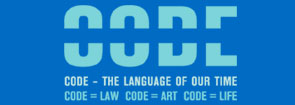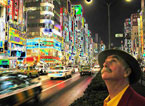| |
|
|
|
|
||
|
||||||||||||||||||||
| |
|
|
|
|
 |
|
 |
|||
| |
||||||||||
| |
||||||||||
 |
|
|||||||||
| |
||||||||||
| |
||||||||||
| |
||||||||||
| |
 |
|
Howard Rheingold at the CODE Symposium
The future of communication technology and the media they enable are will be the focus of Howard Rheingold's talk on Monday, September 8, 10.30 am. Howard Rheingold (USA) is one of the world's foremost authorities on the social implications of technology. Over the past twenty years he has traveled around the world, observing and writing about emerging trends in computing, communications, and culture. One of the creators and former founding executive editor of HotWired, he has served as editor of The Whole Earth Review, editor-in-chief of The Millennium Whole Earth Catalog, and on-line host for The Well. The author of several books, including The Virtual Community, Virtual Reality, and Tools for Thought, he lives in Mill Valley, California. "The most important questions concerning the future of communication technology and the media they enable are, more than ever, questions of power and liberty: - Who will be free to innovate? Entrepreneurs, or employees? - Will people who purchase tools and experiences remain active users of technology, reshaping and evolving media to our own purposes, or will we be turned back into passive consumers, whose only choice is which brand to buy from a small number of vendors? - Will mobile communication media and pervasive computing enable entire populations to organize collective action, or will such collective action be prevented, channeled, and metered by laws and code? The freedom to invent and to use media to organize collective action is at stake. Whether we retain these freedoms is uncertain. And if a sufficient number of people are able to understand, organize, and act, winning that freedom is not a magic ticket to a benign future for technologically-amplified collective action. I called my 2003 book Smart Mobs because not every group who uses media to organize collective action has socially beneficial ends in mind. Super-empowered swarms of people can lend power to democratic collective action, or to fascist collective action. The printing press made science, medicine, and constitutions possible, but the enabling technology for population-wide literacy did not eliminate bad intentions, violence, or injustice. Indeed, technology makes the production of machine guns possible as well as the production of antibiotics. Ultimately, the question about control over the codes of collective action is about whether the powers of worldwide media would be used more wisely by a few, or by many." (Excerpt from the catalog text for Ars Electronica 2003.) |  |
|
|||||
| |
||||||||||
| |
Ingrid Fischer-Schreiber |
|||||||||
| |
 |
|||||||||
| © Ars Electronica Linz GmbH, info@aec.at | ||||||||||